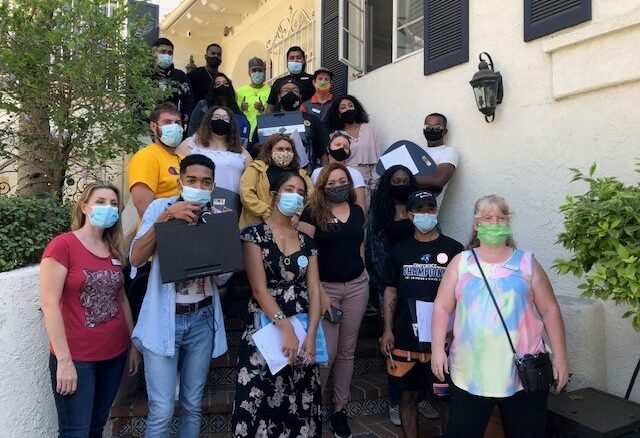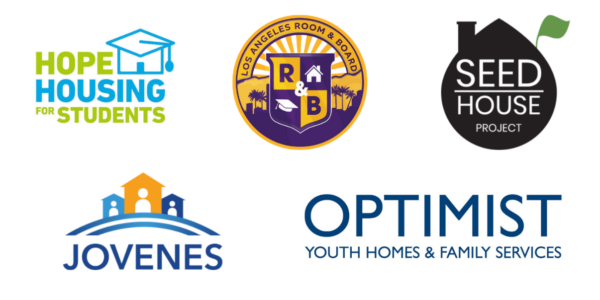The Los Angeles Community College District (LACCD) includes nine colleges, serving a quarter of a million students, in communities covering 900 square miles, and is the nation’s largest community college district. If that data sounds impressive, so too is the district’s commitment to student success.


In late summer, I had the opportunity to meet with LACCD Chancellor Dr. Francisco Rodriguez, Deputy Chancellor Dr. Melinda A. Nish, and Vice Chancellor/CIO Carmen V. Lidz. A month later, I attended part of the district’s executive leadership retreat. These meetings were fantastic opportunities to get to know the LACCD and learn about the many exciting initiatives taking place across the district.
Under Chancellor Rodriguez’s leadership, the district is committed to providing quality, affordable, and equitable education, and supporting students both inside and outside of the classroom. One such way the college is meeting that mission is by advocating at the local, state and federal level, and working to provide affordable housing solutions to housing-insecure students. I hope you will continue to read about the recently passed $5.3 billion facilities bond and how they are using a portion of those funds to grow their housing project.
Many thanks to Ben Gillman, Administrative Assistant, and Maria Luisa Veloz, Legislative and Governmental Relations Officer, in the Office of the Chancellor for writing the important and informative article featured below!
The Los Angeles Community College District Partners with Community Nonprofits to Provide Housing for Homeless Students
Los Angeles County is an expensive place to live. The primary reason for the high cost of living in Los Angeles is the high cost of housing. With a high proportion of Los Angeles residents renting, a low housing vacancy rate, and high housing demand, student financial aid does not cover the total cost of community college attendance. For this reason, the Los Angeles Community College District (LACCD) has looked for ways to support the everyday lives of its diverse and mostly low-income student body. The primary means of uplift is through the life-changing, transformative power of a college education. On top of which, LACCD has been aggressively advocating for policies and funding to provide additional basic needs support for students. LACCD has secured local, state, and federal support for student transportation assistance, food and emergency support, and awards for books, laptops, and hotspots. The District sponsored the landmark AB 19, AB 2, and AB 2266 legislation authored by Assemblyman Santiago to provide tuition-free community college education to full-time, first-time, and returning students..
With a student body where 53% of students report living at or near the poverty line and nearly 50% of students surveyed indicate that they had experienced housing insecurity, LACCD sought solutions for students in need of a safe, stable and reliable place to call home as they pursue their studies. Situations of housing insecurity can include homelessness, living in a car, or couch-surfing with friends, that contribute to a student’s stress and cause disruptions to their educational progress.
In response to this crisis, LACCD recently set its sights on an even loftier goal – providing affordable housing solutions to housing-insecure students. This past November, LACCD successfully passed a $5.3 billion facilities bond that includes up to $500 million for affordable student and staff housing. Given the immediate need for housing, LACCD is not waiting to construct those units to address the immediate need for student housing. LACCD has partnered with nonprofit partners to provide a safe and clean shelter for its homeless students. “True equity in education is making sure we can level the playing field as much as possible and give all students an opportunity to access our colleges and succeed,” LACCD Chancellor Francisco C. Rodriguez said. “No student should be forced to choose between keeping a roof over their head and pursuing an education.”
Before the COVID-19 pandemic, LACCD began an informal partnership with two Los Angeles-based housing providers – LA Room & Board and Hope Housing for Students – to connect students with reliable shelter and support services. Both organizations provide a wide range of housing and wrap-around services to students looking for a safe, affordable place to live as they undertake their educational journeys.

Students at Hope Housing for Students enjoy downtime with an art project.

Students and Staff gather on the steps of the LA Room & Board Westwood House.
LA Room & Board founder Mr. Sam Prater, started his mission to house students by acquiring a vacant former fraternity house known as the Opportunity House in Westwood. Utilizing his background as a higher education housing administrator, and grants and donations from community members, Mr. Prater cleaned and renovated the 50-bed house so that it could provide students with a low-cost housing option while they complete their education. Partnering with LACCD was a natural fit for LA Room & Board due to the large number of low-income students who often begin their educational journeys at one of LACCD’s nine community colleges before transferring to a 4-year university or upskilling to a higher-paid job.
“A lot of the conversation about higher education has been about college access. How do we swing open the doors to the ivory tower? How do we make them wider so that more folks who have been historically excluded from this space can have access?” said Mr. Prater in a recent interview with his alma mater, Fordham University, adding, “It’s not just about housing for us. It’s about how can we set [students] up for success—inside the classroom, in the marketplace, in their personal lives, in their community.”
Throughout 2021, as the pandemic caused increased uncertainty and incidents of housing insecurity surged, LACCD lobbied the State to change policy to allow funding to be granted to nonprofit organizations like LA Room and Board that house homeless students. In addition, in 2021, LACCD and statewide advocates successfully advocated for $100 million statewide for emergency basic needs funding that could be used for housing and other basic needs during the COVID pandemic.
Once state funding was secured through the budget, LACCD looked to create additional nonprofit housing partnerships with other local providers so that homeless students at all nine LACCD colleges could be served. At the beginning of 2022, LACCD signed formal agreements to fund five LA-based housing providers – LA Room & Board, Hope Housing for Students, Optimist Youth Homes and Family Services, Jovenes Housing, and the Seed House Project. The state allocated $100 million statewide in funding for community college basic needs to help address food and housing insecurity. With this designated funding, the Los Angeles Community College District allocated $1.5 million to establish a pilot program to provide housing for more than 100 homeless students. These five nonprofits provide housing for homeless students attending neighboring colleges and universities.

Each unique organization offers students low-rent or rent-free living options, with some preconditions, and the chance to interact with fellow students. The housing units range from dormitory-type housing to single-family residences and apartment-style housing units. Most of the housing locations offer shared living with common kitchens, activity rooms, and plenty of quiet study areas. Many also organize outings and activities like Beach Days and Thanksgiving Potlucks. The housing providers commit to providing three meals a day, internet access, and student support services, which can include enrollment guidance, application assistance, personal counseling, and mental health support. Various work options, internship referrals, and even small business set-ups are available to the housed students.
Juan Ortega-Flores used to share a one-bedroom home with five family members while he pursued an engineering degree at West LA College. With such crowded living quarters, Juan struggled to find quiet places to study and sleep, and the added stress took a toll on his studies. After moving into the Opportunity House at LA Room and Board, Juan’s GPA quickly rose, and he even made the Dean’s list. Perhaps even more importantly, with the pressure of finding affordable housing lifted, Juan started a savings account, found a good job, and connected with internship opportunities. Through The Opportunity House, Juan had access to various academic and financial services, and emotional support, which put him on a path to a successful career and a stable living situation.
“Opportunity House is not just a housing program. It is a community of your peers who are going through the same things,” said Mr. Ortega-Flores. “In the program, you learn to help and support one another.”
As the first full year of the program winds down, LACCD continues to look for additional ways to support students in need of housing options. Feasibility studies are underway to explore future affordable housing options for students. LACCD will maintain its commitment and advocacy efforts to help students as they seek a high-quality education.
About the Los Angeles Community College District
LACCD (www.laccd.edu) is the nation’s largest community college district, educating about 250,000 students annually at its nine colleges that serve the residents of more than 36 cities and communities from 900 square miles of Los Angeles County. Since 1969, the District has provided an important learning pathway for students seeking transfer to four-year colleges or universities while offering two-year degrees and certificated training programs to Southern California’s diverse workforce in many specialized trades and professions. Follow us on Facebook, https://www.facebook.com/LACCD, @LACCD, on Twitter, https://twitter.com/laccd, @laccd, and Instagram, https://www.instagram.com/laccd_edu/, @laccd_edu.
Members of the Board
Gabriel Buelna, Ph.D., President | David Vela, 1st Vice President | Nichelle Henderson, 2nd Vice President
Andra Hoffman | Kelsey K. Iino | Ernest H. Moreno | Steven F. Veres | Kenneth-Alan Callahan, Student Trustee





